What’s the BCG Online Case Interview?
It’s a business problem you must solve.
But unlike the traditional case interview, you must solve this problem by interacting with a chatbot, Casey, on your computer.
No more one-to-one discussion with an interview.
For this chatbot case, you’re on your own.
And acing the Boston Consulting Group (BCG) Online Case interview is no easy feat.
Not only does it require adapting to a unique interview format, but also having case-cracking skills that outshine the other candidates.
Hence, in this comprehensive guide, we will explore the ins and outs of the BCG Online Case, discussing its components, differences from traditional case interviews, and tips for success.
Ready?
Let’s dive in right now.
Table of Contents
Key Takeaways
- The BCG Online Case is an assessment used to simulate real-life problem-solving scenarios. This is a case simulation via chatbot followed by a one-way video assessment.
- It assesses various skills, including problem-solving, business judgment, mathematical aptitude, graph reading, and logical reasoning.
- BCG uses this test during the screening phase to select the candidates who will be invited for interviews.
- The BCG Online Case is mainly used in the US offices right now (but seems to be rolled out worldwide). Alternative screening tests include the BCG Potential Test (also known as BCG online assessment) or the BCG Pymetrics Test.
- After a presentation of a client’s context and problem, candidates have 25 to 30 minutes to answer 8 to 12 questions (the time and number of questions might change, so be careful).
- Also, candidates must record a one-minute video to answer a final question and end the BCG online assessment.
- The online case must usually be performed within 3 days after receiving the link. Candidates hear back within 2 weeks.
- Candidates who fail the test are usually banned for 12 to 18 months.
- Time management is an important factor in acing the BCG online case assessment.
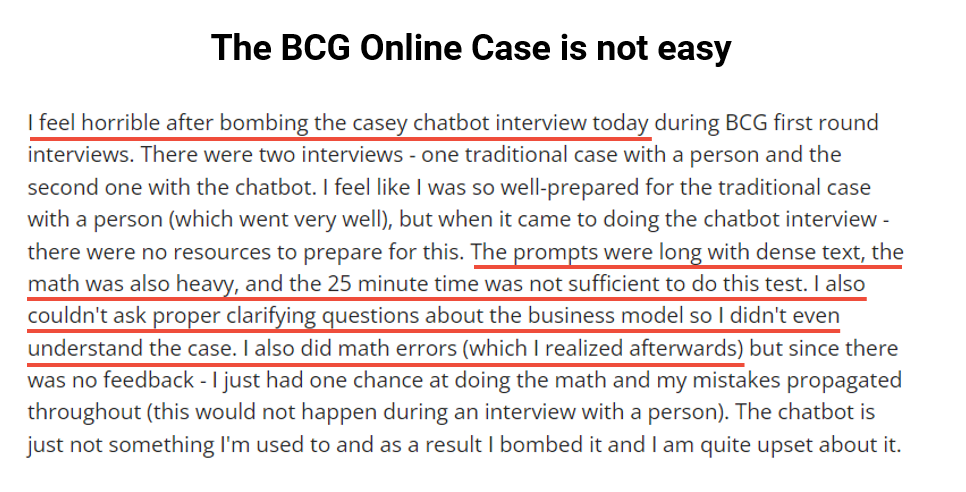
Understanding the BCG Online Case
The BCG Online Case (also called the BCG chatbot case or BCG Casey) plays a significant role in the recruitment process of the Boston Consulting Group.
Why?
Because the BCG Online Case evaluates if applicants have the skills to become best-in-class consultants before interviewing those applicants.
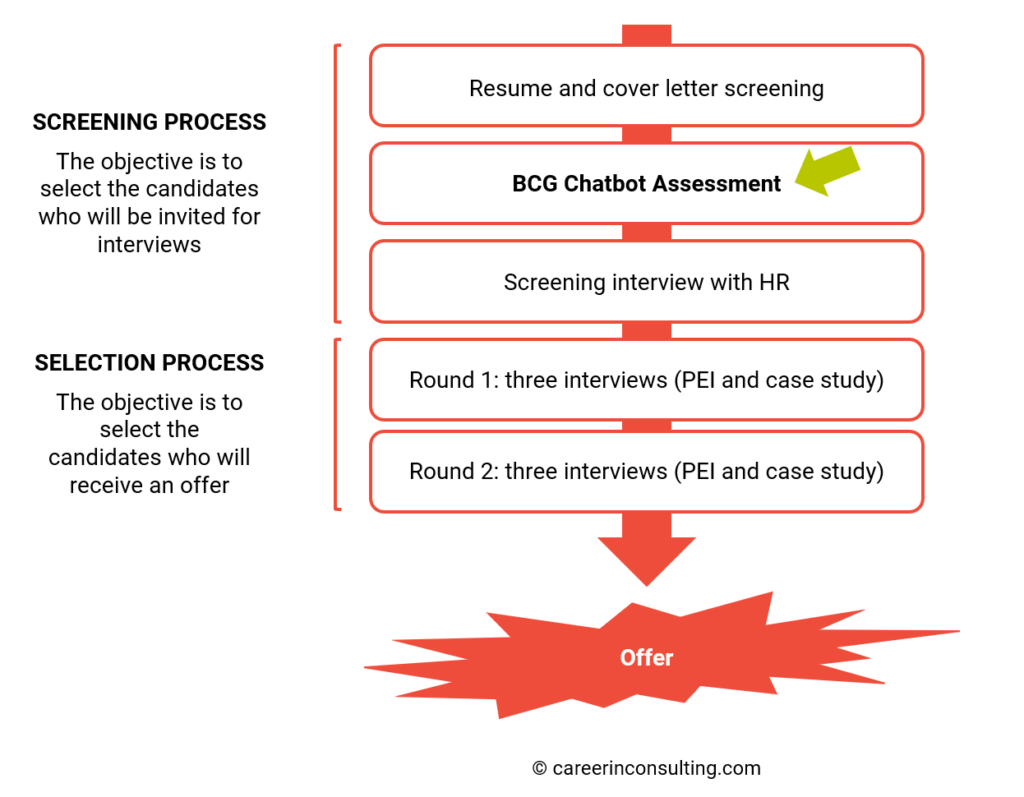
During this unique assessment, candidates engage with a chatbot, Casey, that presents a business case study.
Then, the case includes 8 to 12 questions assessing applicants’ critical thinking, data analysis, and strategic insights.
This online case experience aims to challenge candidates by offering a snapshot of the actual case interview process, simulating real-life problem-solving scenarios encountered by BCG consultants daily.
Finally, the candidates who fail the test are not invited for interviews.
Plus, they are usually banned for a 12 to 18-month period.
Key Components
The BCG Online Assessment is composed of a mix of question formats, ranging from multiple-choice to open questions, and culminates in a final video recommendation.
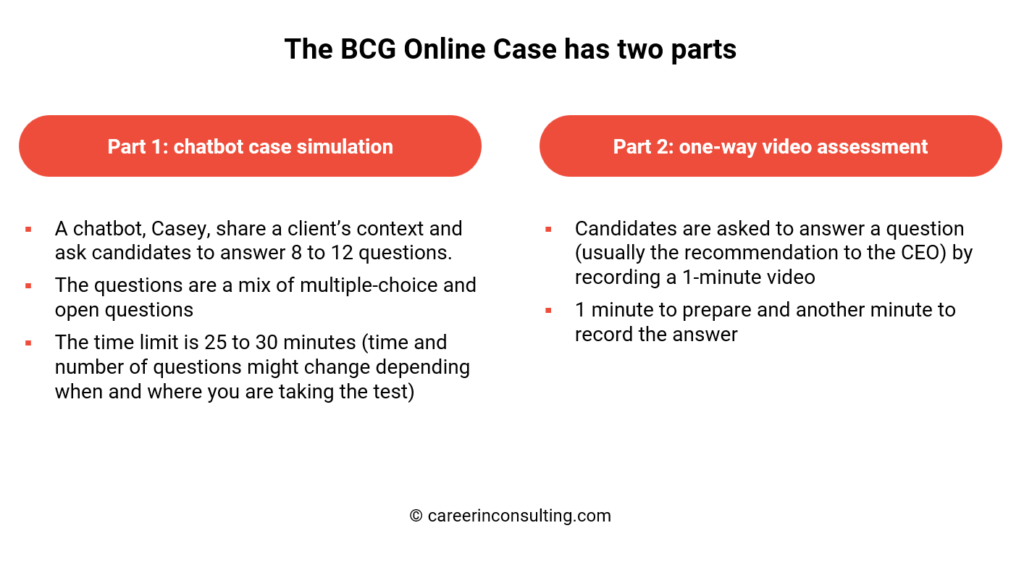
Candidates must complete the 8 to 12 questions within the 30-minute window, followed by a precisely timed 1-minute video on their webcam, presenting their final recommendation.
A sample multiple-choice question:
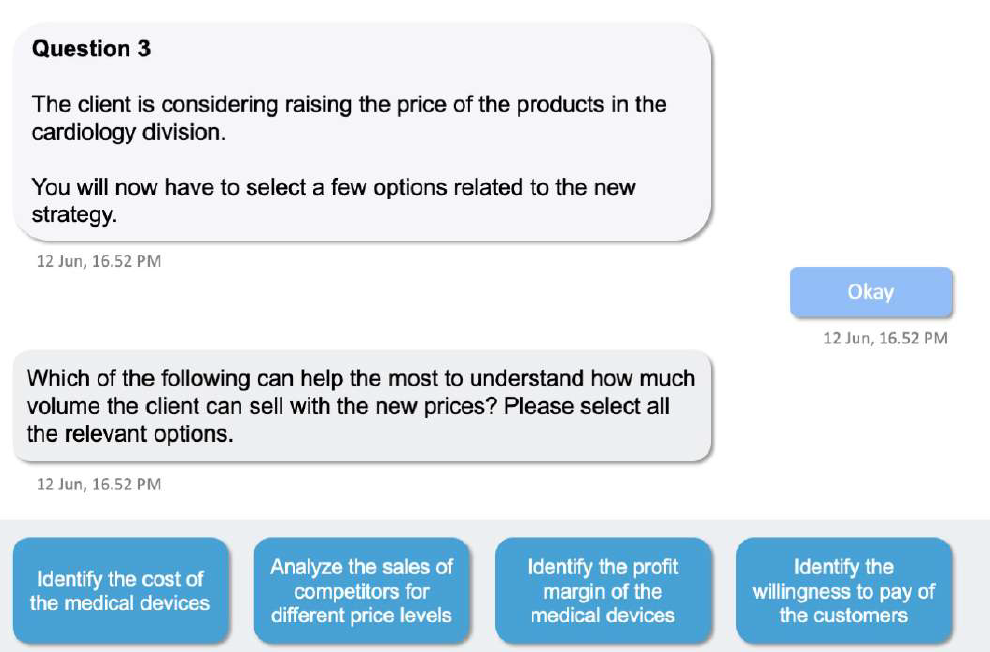
A sample open question:
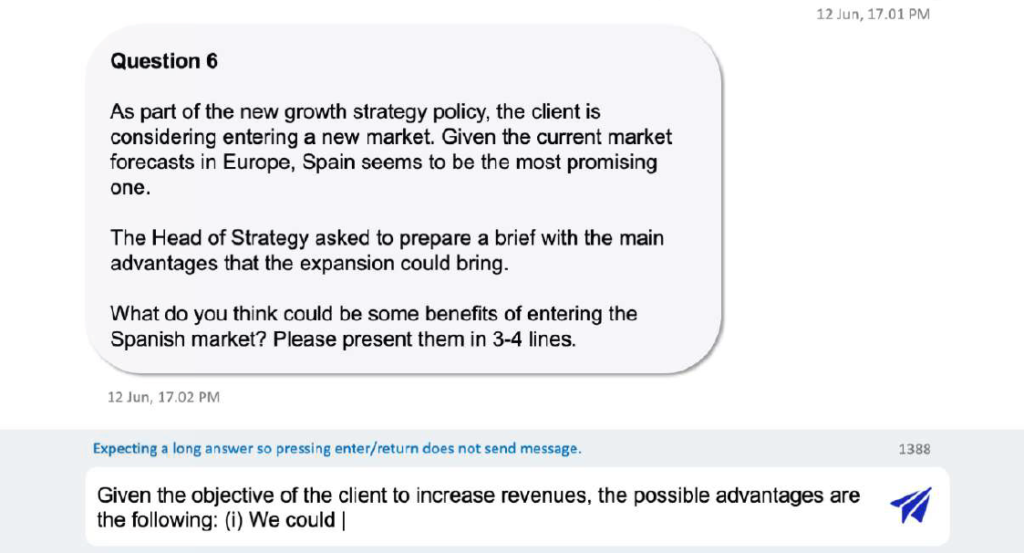
A sample one-way video question:
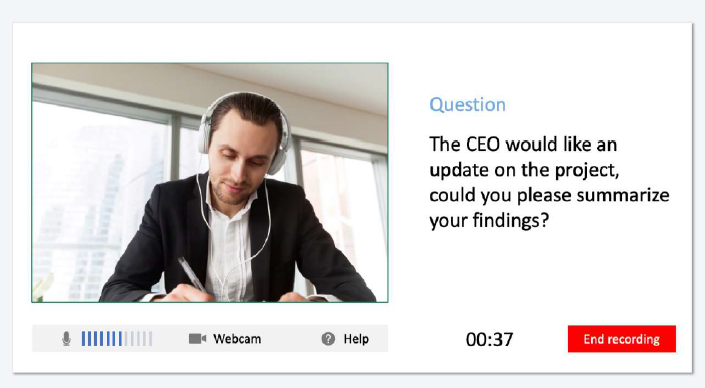
This unique format tests the candidate’s ability to think on their feet and communicate their ideas effectively, similar to a live case interview, making it an essential part of the interview process.
Important: The candidates must answer the questions one by one. In other words: there is no possibility to skip a question or pause the test.
Skills Assessed
A wide range of skills are evaluated in the BCG Online Case, including:
Problem-solving (structuring)
Business judgment
Logical reasoning
Mathematical aptitude
Graph reading and interpretation
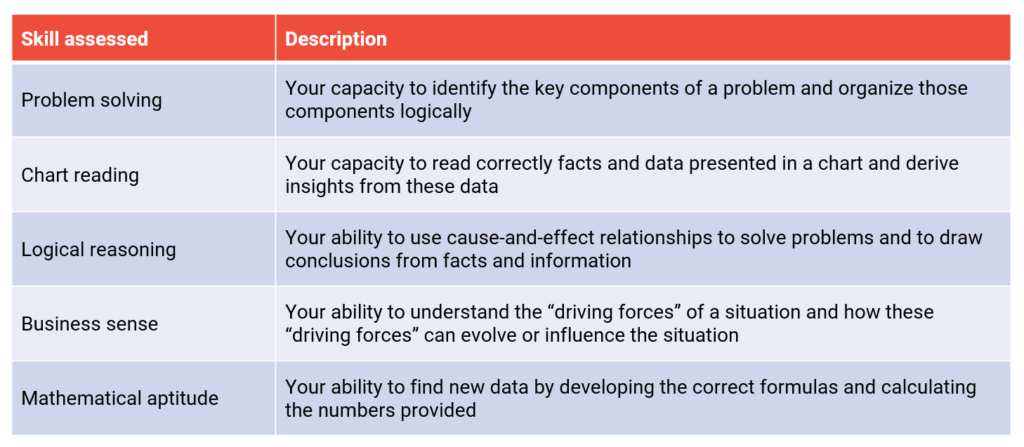
Candidates must demonstrate their understanding of business principles and showcase their overall business knowledge to excel in this assessment.
The BCG Online Case emphasizes proficiency in basic math concepts, data interpretation skills, and tackling math questions, all of which are crucial in solving real-life business problems.
Later in this guide, we’ll discuss how to master the different types of questions used to test those 5 skills.
But first, let’s have a quick overview of how the BCG Casey case compares to the aptitude tests used by the other top-tier consulting firms.
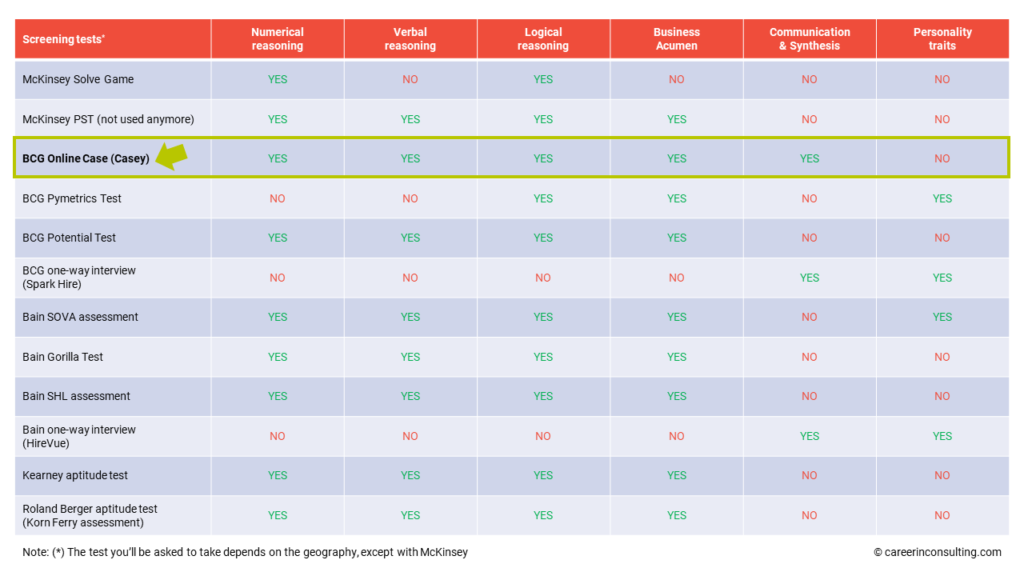
Next, let’s talk about the differences between the BCG Casey case and the traditional case interviews.
Differences Between BCG Online Case and Traditional Case Interviews
While the BCG Online Case shares some similarities with traditional case interviews, such as presenting a business problem to be solved, there are notable differences.
The most significant distinction is the use of Casey, a chatbot, which eliminates the need for a human interviewer and offers a more interactive experience through the BCG Interactive Case Library, which features various online cases.
Additionally, the online interview format presents unique time management challenges, as candidates do not receive the same level of interviewer feedback as in traditional case interviews.
Interaction with Casey Chatbot
In the BCG Online Case, success hinges on adapting to interaction with Casey, the non-human interviewer.
Candidates must navigate through questions without guidance, relying on their problem-solving skills and ability to structure their thoughts effectively.
Given the lack of feedback from the chatbot, a solid initial structure and a well-prepared approach are necessary to ensure smooth progression through the questions.
Time Management Challenges
In the BCG Online Case, time management is crucial as candidates must balance accuracy and speed within strict time limits.
The lack of interviewer feedback and the need to think and respond swiftly create a demanding situation, requiring candidates to prioritize questions, avoid getting stuck on difficult problems, and know when to skip or guess.
Calculator are allowed
Candidates can use a calculator during the BCG Casey test.
While it seems to make the test easier, especially for candidates with limited quantitative backgrounds, remember that calculators are not allowed during live case interviews.
Hence, sooner than later, all candidates must develop strong calculation skills.
Okay, now let’s talk about how to ace the different types of questions asked in the BCG online cases:
- Structuring questions
- Business acumen questions
- Math questions
- Chart questions
- One-way video (or synthesis) questions
Mastering the structuring questions
The structuring questions are most likely asked at the beginning of the assessment.
In this type of question?
The chatbot asks you to choose 2-4 answers among 8 different options.
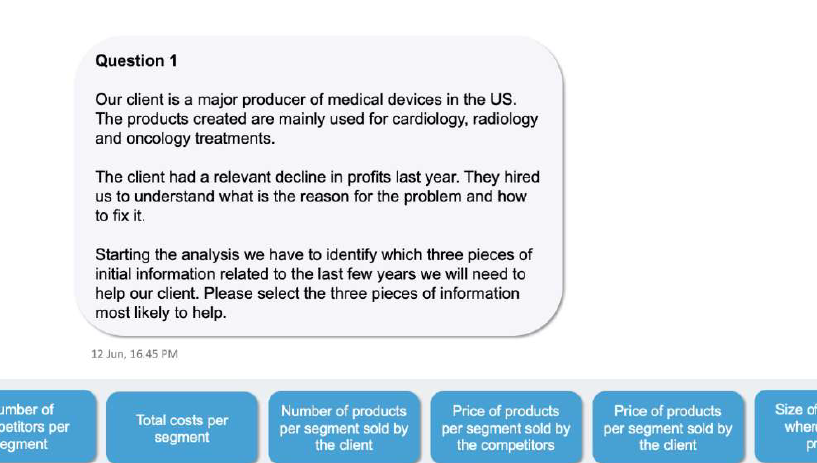
This is similar to creating an issue tree at the beginning of a live case interview.
Check this article if you don’t know what an issue tree is.
How to correctly answer Structuring questions
Use the following approach to answer the structuring questions:
Step 1: Understand which metric the client wants to optimize
Step 2: Read each option provided one by one and select ALL the options that can influence this metric
For example, the client wants to optimize its profits.
And the factors that influence the client’s profits include “total costs per segment,” “the number of products per segment sold by the client,” and “the price of products per segment sold by the client.”
How to develop this skill
Refining problem-solving skills is crucial for success in the BCG Online Case.
Practicing mock case interviews is the best way to develop your structuring skills.
All case interviews include structuring questions.
For instance, when developing an issue tree at the beginning of the case.
Or during the case, when answering brainstorming questions such as “Which factors influence the market growth?”
You can practice independently, with friends, or with an expert.
Regardless of how you practice, you must track your mistakes and improvement.
Practice Resources
You can find a library of 280 case examples on this page.
These case examples?
They are directly from top-tier firms’ websites or case books from prestigious universities like Wharton, Harvard, or INSEAD.
Get 4 Complete Case Interview Courses For Free

You need 4 skills to be successful in all case interviews: Case Structuring, Case Leadership, Case Analytics, and Communication. Join this free training and learn how to ace ANY case questions.
Acing the business acumen questions
Strong business judgment is what separates the good from the best consultants.
And BCG wants to assess how strong your business judgment is.
In other words:
They want to know if you understand how “business forces” can influence a situation or an environment.
But these “business forces” can take many forms, such as supply & demand, competition dynamics, regulation, etc.
Hence, you must develop a strong business culture to be able to understand how these “business forces” work.
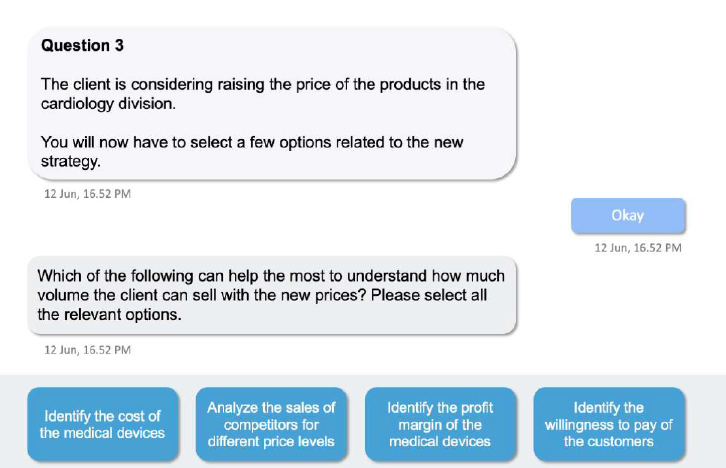
How to correctly answer Business Acumen questions
Use the following approach to answer the business acumen questions:
Step 1: Understand which metric the client wants to optimize
Step 2: Select, from the list of options provided, the factors that can influence this metric
For example, the client wants to optimize its pricing.
And the factors that influence the client’s pricing include “the willingness to pay of the customers” and “the sales of competitors for different price levels.”
How to develop this skill
One of the useful tactics for learning to ‘think business’ is when you learn about recent business events, try to figure out the (direct and indirect) implications of the event.
For example, imagine that the OPEC nations have decided to restrict oil supply.
A first direct implication can be that gas prices will increase, which means that oil company revenues will increase as well.
An indirect implication can be that the sales of SUVs will decrease, which means that Auto companies will be offering more sales promotions on SUVs.
Another indirect implication can be that the use of public transportation will increase.
And so on… you can think of dozens of other implications.
If you want to learn more about developing your business acumen, check out our coaching program on this page or sign up for our free case interview training.
Practice Resources
I recommend reading business articles from the following websites:
Bain.com
BCG.com
McKinsey.com
FT.com
Business insider (the strategy section)
When reading these articles, try to understand the underlying business forces that created or solved a problem.
Mastering the Math questions
For all consulting firms, including BCG, a strong correlation exists between a candidate’s quantitative skills and the probability that this candidate will become a best-in-class consultant.
That’s why top consulting firms love asking quantitative questions in case interviews.
And the Casey chatbot interview is no exception.
Hence, you’ll have to answer Math questions like this one:
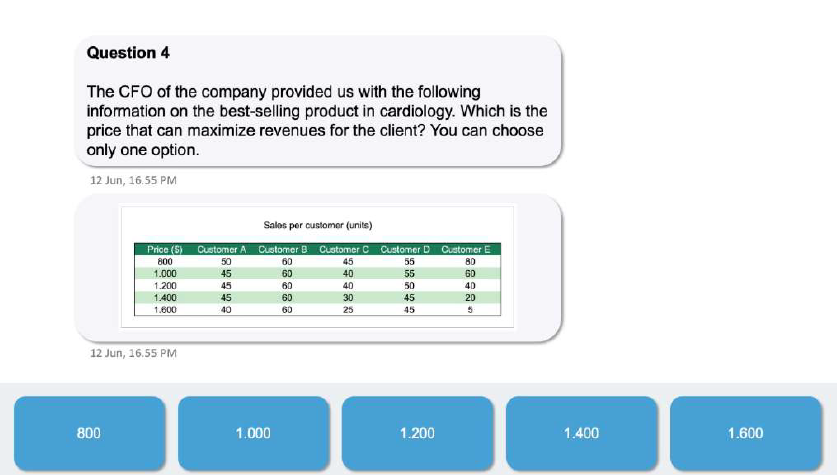
How to correctly answer Math questions
Use the following approach to answer the math questions:
Step 1: Understand the objective and the data presented (units, titles, etc.)
Step 2: Develop the formula you need to answer the question
Step 3: Plug the numbers provided in your formula and do the Math
Step 4: If you have time, do a quick sanity check of your answer
For example, the client wants to optimize its pricing to maximize revenues.
Since revenues are equal to volumes times price, you need to add all the units per price level and multiply the total volumes by the price levels.
The answer will be the price level that maximizes the client’s revenues.
Note: calculators are allowed during the BCG test.
How to develop this skill
To sharpen your quantitative skills, practice with mock quantitative tests such as:
Mock GMAT Tests: These tests are excellent for practicing various quantitative problems.
Case Interviews: Simulate the real experience using case interviews that include math questions.
Mock McKinsey PST or BCG Potential Test.
Practice Resources
Don’t limit yourself to traditional methods.
Various online platforms and apps are designed to help you practice mental calculations and case-specific math problems.
By mastering case interview math, you’re not just showcasing your ability to crunch numbers.
You’re proving that you can think critically, make data-driven decisions, and lead a case to its logical conclusion.
Acing the Chart questions
Analyzing lots of data is part of the daily routine of a consultant.
And these data come in many forms: charts, data tables, texts, etc.
Hence, you’ll have to answer Chart questions like this one:
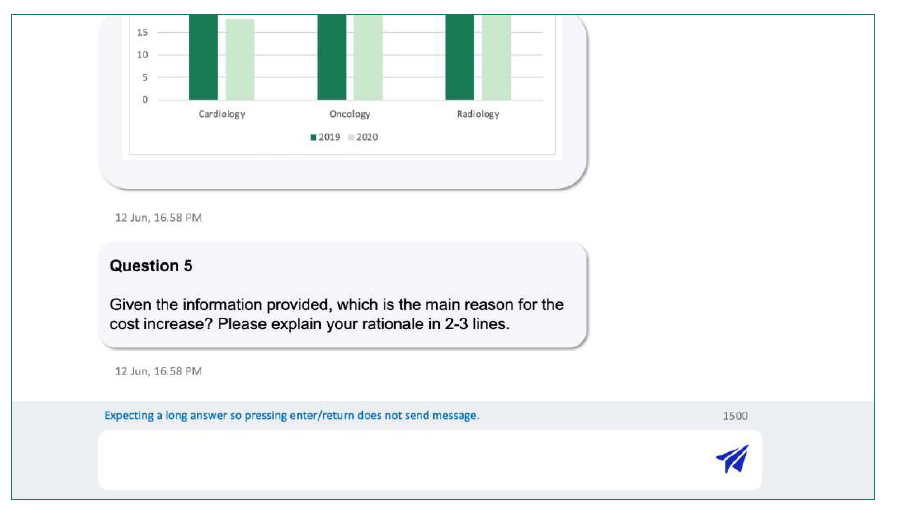
To answer a chart question, you might have to analyze more than one chart.
How to correctly answer Chart questions
Use the following approach to answer the chart questions:
Step 1: Understand the objective and the data presented (units, titles, etc.)
Step 2: Develop the formula you need to answer the question
Step 3: Find the data you need in the charts presented
Step 4: Plug numbers from these charts into your formula and do the math.
This is important to do step 2 before step 3.
In other words:
You don’t want to jump aimlessly in the chart.
Instead, have a clear goal (know what you’re looking for) before wasting your precious time reading the chart.
How to develop this skill
As for the Math questions, you can practice with mock quantitative tests like GMAT, McKinsey PST, or BCG Potential test.
Additionally, this article shares more tips on developing your analytical skills (including chart reading).
Practice Resources
First, you can practice with GMAT tests.
Here are some examples.
Besides, visit websites full of charts like The Economist, The Wall Street Journal, etc.
Find charts, draw conclusions from these charts, and read the article to check if your conclusions make sense.
Also, practice with the case examples you can find in these case books.
Additionally, here are more resources:
- SHL practice tests (here)
- SHL verbal reasoning questions (here)
- SHL numerical reasoning questions (here)
- SHL inductive reasoning questions (here)
- Free aptitude test examples (here)
- Kearney mock recruitment test (here)
- McKinsey PST examples (here, here, and here)
Finally, you can use a platform like JobTestPrep to practice with tests that mimic real tests.
Tackling the one-way video question
With this question, BCG will test your communication skills and capacity to synthesize your work.
Most of the time, the one-way video question asks you to give a recommendation to the client’s CEO.
The one-way video question looks like this:

How to correctly answer One-Way Video questions
Use the following approach to answer the one-way question:
Step 1: Repeat the objective
Step 2: Provide an answer-first conclusion (following the pyramid principles)
Step 3: Discuss potential next steps and risks
Your answer is very similar to the conclusion you must provide in a real-life case interview.
For instance:
“Our objective was to understand why profits declined and how to fix this problem. The drop in profits comes from an increase in our client’s labor costs. A solution is outsourcing some administrative activities in a low-labor-cost country such as [X]. For the next steps, I would estimate the impact of our client’s labor costs and analyze the potential risks, such as the impact on our client’s brand image and quality of services.“
How to develop this skill
There is a must-read book if you want to become a consultant.
This book?
The pyramid principle by Barbara Minto.
If you don’t have this book in your library, buy it now.
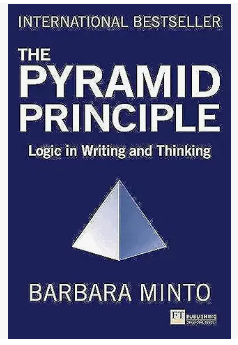
Practice Resources
As for structuring questions, use this library of 280 case examples to practice giving recommendations and improving your communication skills.
Frequently Asked Questions (and final tips)
Is the Online Case important for BCG?
The Online Case is an integral part of the BCG recruitment process and provides the firm with a way to evaluate essential consulting skills, such as structuring, business sense, math skills, graph interpretation, and synthesis. As such, it is highly important for BCG.
What is BCG online case experience?
BCG Online Case Experience is a 25-minute assessment that challenges candidates with a fictional client case presented by the online chatbot ‘Casey’, requiring them to answer 8-12 questions to demonstrate their business skills.
How much does the BCG online case matter?
BCG online case is important because if your performance on the test isn’t up to the mark, then it doesn’t matter what other documents you provide; you won’t be invited to the first round of interviews.
What is the passing score for the BCG online case?
BCG’s online test is not used to filter candidates, but an average performance would be considered a good result with 70% of questions answered correctly.
What is the role of the chatbot, Casey, in the BCG Online Case?
Casey is an AI-powered chatbot that facilitates the BCG Online Case, assessing candidates’ critical thinking, data analysis, and strategic insights through various question formats.
Will I have to take the test from home?
Yes. BCG will send you a link to take the test.
Can I pause the game once it has started?
No. You must go through all the questions at one time once you have started.
Hence, it’s important to have an effective time management strategy.
Effective time management strategies for the BCG Online Case include avoiding getting stuck on difficult problems and knowing when to skip or guess.
Any last advice?
Before starting the test, ensure you are in a silent room (mute your phone) and check your internet connection.
BCG online case: final words
In conclusion, acing the BCG Online Case requires thorough preparation, mastery of relevant skills, and effective time management.
So, I hope you enjoyed this guide about the BCG online case.
And that you feel more confident about taking this online test, paving your way to a successful career with the Boston Consulting Group.
Now, I’d like to hear from you: What’s your biggest challenge in answering the 10 questions?
Managing your time effectively?
The one-way video assessment?
The numerical questions?
Let me know by leaving a quick comment below right now.
Sébastien
Get 4 Complete Case Interview Courses For Free

You need 4 skills to be successful in all case interviews: Case Structuring, Case Leadership, Case Analytics, and Communication. Join this free training and learn how to ace ANY case questions.
